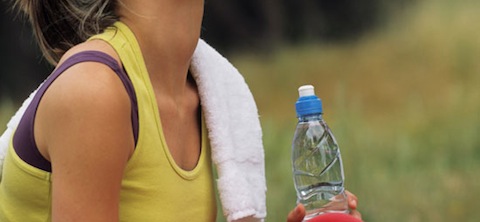
Jun 01, 2011 • 3 min read
The Truth About Sports Drinks and Why Young Athletes Don’t Need Them

Last week, I talked about staying hydrated in the hot summer months to prevent heat-related illnesses. And although most experts recommend plain old H2O, I’m sure many of you thought, “I’ll just buy a six-pack of [insert your favorite sports drink here] and that’ll be just as good or even better.” Guess what? You’re wrong.
Sports drinks are not meant to replace water — or even milk — in the daily diets of growing athletes. Their sugar content is typically just as high as, or higher than, that of soda, and they don’t supply growing bodies with needed calcium and vitamin D. Experts recommend that children drink no more than one, 8-ounce sugared drink per day, which includes most sport drinks.
While a single sports drink, consumed along with water after a lengthy practice or intense game to replenish electrolytes is ok, unfortunately, many young athletes are consuming two, three, even five of these sports drinks each day as part of their typical routine, assuming they are a healthier alternative to soda. But they’re mistaken.
A study published on Monday by the American Academy of Pediatrics in the journal, Pediatrics, recommends that children not drink sports drinks with meals or just because they are thirsty. Why? Because, as the report’s authors, Dr. Marcie Schneider and Dr. Holly Benjamin, assert, “frequent or excessive intake of caloric sports drinks can substantially increase the risk for overweight or obesity in children and adolescents.” Even if your child is very active, he or she really doesn’t need those extra calories from sugar, period.
And as ubiquitous as sports drinks are in young people’s diets, caffeine-spiked energy drinks are even worse. As the report’s authors contend, “Caffeine and other stimulant substances contained in energy drinks have no place in the diet of children and adolescents.” That includes their favorite cola drinks and coffee.
Reports of young athletes experiencing elevated heart rates and jitteriness after consuming these energy drinks and then exercising are frightening. The report’s authors maintain that the stimulants in these drinks are particularly dangerous when combined with exercise, because the combination increases the risk of heart failure. And, linking back to last week’s topic, caffeine also increases the risk of dehydration–exactly what kids don’t need during hot summer practices and tournaments.
Still not convinced? Take a look at Monday’s article from ABC News: Are Sports Drinks Better Than Energy Drinks For Kids? And this audio report is from NPR’s Morning Edition:
Do you, as a parent, really need much more data than that to steer your kids away from caffeine-packed energy drinks? And do you really think your young athlete needs all that extra sugar and empty calories hiding in their favorite sports drinks? I don’t. While I was sold on good old water to hydrate and quench my children’s thirst even before researching this topic, I’m more sold now.
I hope this makes you think twice before you pack that sports drink in your child’s lunch box or backpack tomorrow.
 Emily is a freelance writer living in Berkeley, California. Emily brings a lot of first-hand experience to the table having been team manager for her children’s soccer, baseball, basketball, and softball teams and she also captains a number of her own adult tennis teams.
Emily is a freelance writer living in Berkeley, California. Emily brings a lot of first-hand experience to the table having been team manager for her children’s soccer, baseball, basketball, and softball teams and she also captains a number of her own adult tennis teams.
